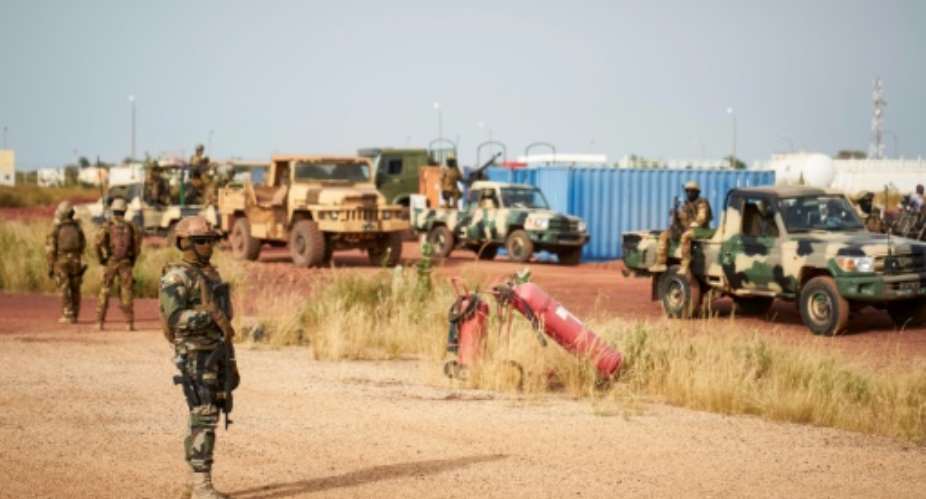With more than 50 Malian soldiers killed over the past two days, the authorities seem powerless to stop the growing toll from jihadist attacks, even with the support of an international force in the region.
Mali is one of the countries in the Sahel region of Africa that has been caught in the eye of the jihadist storm since 2012, along with Niger, Burkina Faso, Niger and Chad.
The latest attack was late on Saturday, when a roadside bomb claimed the lives of two more Malian soldiers, wounding six others, in the central region of Mopti, the army said in a tweet.
That came just a day after the devastating jihadist raid on a military base at Indelimane, in the eastern Menaka region near the border with Niger, that killed 49 of their comrades.
And a French soldier died in the same region Saturday after his armoured vehicle struck an improvised explosive device.
These were just the latest in a string of attacks underscoring the fragility of a region where jihadist violence has claimed hundreds of lives.
A Malian army officer told AFP that Friday's surprise attack was by gunmen riding motorbikes, the favoured means of transport of the jihadist fighters in the region.
According to a UN report on the attack that AFP was able to consult, three different groups attacked the Indelimane military base simultaneously.
MINUSMA, the 13,000-strong UN peacekeeping mission in Mali, helped the army build the base last year. So too did soldiers from France's 4,500-strong Barkhane force, deployed in the Sahel region of Africa since 2014.
The French soldier killed by the roadside bomb attack Saturday belonged to that force.
The Islamic State group claimed both Friday's attack on at Indelimane and the roadside bomb that killed the French soldier in a statement Saturday signed from its "West African province".
A spokesman for the Islamic State in the Greater Sahara, the groups's branch in the Sahel, confirmed to AFP on Sunday that they had carried out the attack.
'France remains our main enemy'
"We had learned that the Malian army was working in the camps with apostates," said 'Abdoul Chiquiti', the spokesman's nom de guerre.
"We succeeded in wiping out the camp," he said, while adding: "France remains our main enemy."
Mali's president, Ibrahim Boubacar Keita, has so far not made any public statement about the latest attacks.
 UN, African and French forces in the G5 Sahel region. By (AFP)
UN, African and French forces in the G5 Sahel region. By (AFP)
But these losses come a month after jihadist attacks on military bases at Mondoro and Boulkessi near the southern border with Burkina Faso.
The official toll from those attacks was 40, but a number of observers have argued that the real losses might have been higher.
Following those attacks, the wives of soldiers staged several protests in the capital Bamako and in the central town of Sevare.
Northern Mali fell into the hands of jihadists in 2012 before the militants were forced out by a French-led military intervention.
Neighbouring Burkina Faso and Niger have also been infiltrated by insurgents, at the cost of hundreds of lives.
The G5 Sahel, a five-nation joint taskforce set up in 2014 to tackle the jihadist threat, is also active in the region. It comprises troops from Burkina Faso, Mali, Mauritania, Niger and Chad.





 No need to tax churches – Bawumia
No need to tax churches – Bawumia
 Voter registration: NPP rebukes NDC over request for serial numbers of BVR kits
Voter registration: NPP rebukes NDC over request for serial numbers of BVR kits
 Parliament to summon VRA for failing to dredge Volta estuary for years
Parliament to summon VRA for failing to dredge Volta estuary for years
 Stop the desires for coup d'état — Ghanaians told
Stop the desires for coup d'état — Ghanaians told
 Manhyia Palace bans Tricycle riders on Sunday to climaxes Otumfuo's 25th anniver...
Manhyia Palace bans Tricycle riders on Sunday to climaxes Otumfuo's 25th anniver...
 Blame Supreme Court for limited voter registration challenges – George Opare Add...
Blame Supreme Court for limited voter registration challenges – George Opare Add...
 Excessive partisanship breeds madness — Prof Gyampo on NPP’s defence of cedi dep...
Excessive partisanship breeds madness — Prof Gyampo on NPP’s defence of cedi dep...
 PDS scandal: ‘The totality of Ghana’s loss is the ‘dumor’ being experienced toda...
PDS scandal: ‘The totality of Ghana’s loss is the ‘dumor’ being experienced toda...
 677,140 births and 50,992 deaths recorded in 2022 - Statistical Report
677,140 births and 50,992 deaths recorded in 2022 - Statistical Report
 Ghana’s electoral commission is one that trusts thieves — Omane Boamah
Ghana’s electoral commission is one that trusts thieves — Omane Boamah
